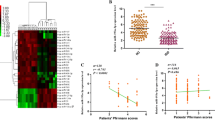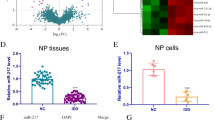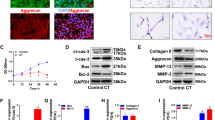Abstract
MicroRNAs (miRNAs/miRs) are important biomarkers for the progression of intervertebral disc degeneration (IDD). We investigated the role of miR-30d in IDD progression through its interactions with forkhead box O3 (FOXO3) and C-X-C motif ligand 10 (CXCL10). We first measured the expression of miR-30d, FOXO3, and CXCL10 in NP cells cultured from IDD patients. RNA-immunoprecipitation (RIP), chromatin immunoprecipitation (ChIP) and dual-luciferase reporter assays were then employed to test the relationship among miR-30d, FOXO3, and CXCL10. Besides, gain- and loss-of function approaches were performed to assess the functional roles of miR-30d and FOXO3 in IDD in vitro and in vivo. We found high expression of miR-30d and CXCL10 and low expression of FOXO3 in IDD. We showed that miR-30d specifically targeted FOXO3, and that down-regulation of miR-30d promoted proliferation and inhibited apoptosis of NP cells in IDD by increasing the expression of FOXO3. Besides, FOXO3 inhibited apoptosis of NP cells by downregulation of CXCL10 expression. Moreover, inhibition of miR-30d promoted proliferation and inhibited apoptosis of NP cells in IDD by decreasing CXCL10. Furthermore, findings in the mouse IDD model confirmed the inhibitory role of decreased miR-30d in IDD progression. Thus, we show that downregulation of miR-30d could promote the proliferation of NP cells by increasing FOXO3 and decreasing CXCL10 expression, which may provide a novel therapeutic target for IDD.







Similar content being viewed by others
Change history
04 February 2022
A Correction to this paper has been published: https://doi.org/10.1007/s00223-021-00937-x
References
Navone SE, Marfia G, Giannoni A, Beretta M, Guarnaccia L, Gualtierotti R, Nicoli D, Rampini P, Campanella R (2017) Inflammatory mediators and signalling pathways controlling intervertebral disc degeneration. Histol Histopathol 32(6):523–542. https://doi.org/10.14670/HH-11-846
Feng Y, Egan B, Wang J (2016) Genetic factors in intervertebral disc degeneration. Genes Dis 3(3):178–185. https://doi.org/10.1016/j.gendis.2016.04.005
Vieira LA, Dos Santos AA, Peluso C, Barbosa CP, Bianco B, Rodrigues LMR (2018) Influence of lifestyle characteristics and VDR polymorphisms as risk factors for intervertebral disc degeneration: a case-control study. Eur J Med Res 23(1):11. https://doi.org/10.1186/s40001-018-0309-x
Sampara P, Banala RR, Vemuri SK, Av GR, Gpv S (2018) Understanding the molecular biology of intervertebral disc degeneration and potential gene therapy strategies for regeneration: a review. Gene Ther 25(2):67–82. https://doi.org/10.1038/s41434-018-0004-0
Wang J, Chen H, Cao P, Wu X, Zang F, Shi L, Liang L, Yuan W (2016) Inflammatory cytokines induce caveolin-1/beta-catenin signalling in rat nucleus pulposus cell apoptosis through the p38 MAPK pathway. Cell Prolif 49(3):362–372. https://doi.org/10.1111/cpr.12254
Li Z, Yu X, Shen J, Chan MT, Wu WK (2015) MicroRNA in intervertebral disc degeneration. Cell Prolif 48(3):278–283. https://doi.org/10.1111/cpr.12180
Lv J, Li S, Wan T, Yang Y, Cheng Y, Xue R (2018) Inhibition of microRNA-30d attenuates the apoptosis and extracellular matrix degradation of degenerative human nucleus pulposus cells by up-regulating SOX9. Chem Biol Interact 296:89–97. https://doi.org/10.1016/j.cbi.2018.09.010
Lutzner N, Kalbacher H, Krones-Herzig A, Rosl F (2012) FOXO3 is a glucocorticoid receptor target and regulates LKB1 and its own expression based on cellular AMP levels via a positive autoregulatory loop. PLoS One 7(7):e42166. https://doi.org/10.1371/journal.pone.0042166
Alvarez-Garcia O, Matsuzaki T, Olmer M, Masuda K, Lotz MK (2017) Age-related reduction in the expression of FOXO transcription factors and correlations with intervertebral disc degeneration. J Orthop Res 35(12):2682–2691. https://doi.org/10.1002/jor.23583
Brandstetter B, Dalwigk K, Platzer A, Niederreiter B, Kartnig F, Fischer A, Vladimer GI, Byrne RA, Sevelda F, Holinka J, Pap T, Steiner G, Superti-Furga G, Smolen JS, Kiener HP, Karonitsch T (2019) FOXO3 is involved in the tumor necrosis factor-driven inflammatory response in fibroblast-like synoviocytes. Lab Invest 99(5):648–658. https://doi.org/10.1038/s41374-018-0184-7
Feng C, He J, Zhang Y, Lan M, Yang M, Liu H, Huang B, Pan Y, Zhou Y (2017) Collagen-derived N-acetylated proline-glycine-proline upregulates the expression of pro-inflammatory cytokines and extracellular matrix proteases in nucleus pulposus cells via the NF-kappaB and MAPK signaling pathways. Int J Mol Med 40(1):164–174. https://doi.org/10.3892/ijmm.2017.3005
Tang Z, Hu B, Zang F, Wang J, Zhang X, Chen H (2019) Nrf2 drives oxidative stress-induced autophagy in nucleus pulposus cells via a Keap1/Nrf2/p62 feedback loop to protect intervertebral disc from degeneration. Cell Death Dis 10(7):510. https://doi.org/10.1038/s41419-019-1701-3
Qian S, Liu R (2019) miR-30b facilitates preeclampsia through targeting MXRA5 to inhibit the viability, invasion and apoptosis of placental trophoblast cells. Int J Clin Exp Pathol 12(11):4057–4065
Su X, Qian C, Zhang Q, Hou J, Gu Y, Han Y, Chen Y, Jiang M, Cao X (2013) miRNomes of haematopoietic stem cells and dendritic cells identify miR-30b as a regulator of Notch1. Nat Commun 4:2903. https://doi.org/10.1038/ncomms3903
Kahn AJ (2015) FOXO3 and related transcription factors in development, aging, and exceptional longevity. J Gerontol A Biol Sci Med Sci 70(4):421–425. https://doi.org/10.1093/gerona/glu044
Liu P, Chang F, Zhang T, Gao G, Yu C, Ding SQ, Zuo GL, Huang XH (2017) Downregulation of microRNA-125a is involved in intervertebral disc degeneration by targeting pro-apoptotic Bcl-2 antagonist killer 1. Iran J Basic Med Sci 20(11):1260–1267. https://doi.org/10.22038/IJBMS.2017.9542
Wang B, Wang D, Yan T, Yuan H (2016) MiR-138-5p promotes TNF-alpha-induced apoptosis in human intervertebral disc degeneration by targeting SIRT1 through PTEN/PI3K/Akt signaling. Exp Cell Res 345(2):199–205. https://doi.org/10.1016/j.yexcr.2016.05.011
Li X, Du N, Zhang Q, Li J, Chen X, Liu X, Hu Y, Qin W, Shen N, Xu C, Fang Z, Wei Y, Wang R, Du Z, Zhang Y, Lu Y (2014) MicroRNA-30d regulates cardiomyocyte pyroptosis by directly targeting foxo3a in diabetic cardiomyopathy. Cell Death Dis 5:e1479. https://doi.org/10.1038/cddis.2014.430
Duan ZQ, Li Y, Li L (2017) Experimental evidences for miR-30b as a negative regulator of FOXO3 upregulated by kynurenine. Immunol Res 65(5):1074–1082. https://doi.org/10.1007/s12026-017-8949-4
Xia JB, Liu GH, Chen ZY, Mao CZ, Zhou DC, Wu HY, Park KS, Zhao H, Kim SK, Cai DQ, Qi XF (2016) Hypoxia/ischemia promotes CXCL10 expression in cardiac microvascular endothelial cells by NFkB activation. Cytokine 81:63–70. https://doi.org/10.1016/j.cyto.2016.02.007
Funding
None.
Author information
Authors and Affiliations
Contributions
PX, XG, FL, LWS and YFS designed the study. PX collated the data, carried out data analyses and produced the initial draft of the manuscript. XG, FL, LWS and YFS contributed to drafting the manuscript. All authors have read and approved the final submitted manuscript.
Corresponding author
Ethics declarations
Conflict of interest
The authors declare that they have no conflict of interest.
Research Involving Human and Animal Rights
Study protocols were approved by Ethic Committee of China-Japan Union Hospital of Jilin University and followed the ethical principles for medical research involving human subjects of the Declaration of Helsinki. The animal experiments were performed in strict accordance with the recommendations in the Guide for the Care and Use of Laboratory Animals of the National Institutes of Health and followed a protocol approved by the Institutional Animal Care and Use Committee of China-Japan Union Hospital of Jilin University. All efforts were made to minimize the discomfort of the included animals.
Informed Consent
Written informed consent was obtained from all patients prior to the study.
Additional information
Publisher's Note
Springer Nature remains neutral with regard to jurisdictional claims in published maps and institutional affiliations.
Rights and permissions
About this article
Cite this article
Xia, P., Gao, X., Li, F. et al. Down-Regulation of microRNA-30d Alleviates Intervertebral Disc Degeneration Through the Promotion of FOXO3 and Suppression of CXCL10. Calcif Tissue Int 108, 252–264 (2021). https://doi.org/10.1007/s00223-020-00760-w
Received:
Accepted:
Published:
Issue Date:
DOI: https://doi.org/10.1007/s00223-020-00760-w




